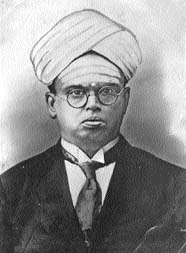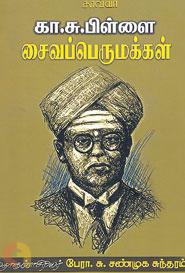K. Subramania Pillai
K. Subramania Pillai (Kaa. Su. Pillai) (Kandhimathinathapillai Subramania Pillai) (November 5, 1888 - April 30, 1945) was a Tamil scholar and a Tamil literature history teacher. He was a Shaivite, a lawyer, a Tamil professor, a translator, an orator, and a speechwriter. He was multilingual in Tamil, English, Sanskrit, and Malayalam.
Birth, Education
K. Subramania Pillai was born on November 5, 1888, to Shaiva Vellalar Gandhimathinatha Pillai and Meenakshi Pillai. He received his primary education in a thinnai (porch) school in Tirunelveli. In 1906, he bagged the first rank in the Chennai Matriculation exam. In 1908, he topped the F. A (Fellow of Arts) examination in the University of Madras. He won first place as a student in a poet examination conducted by Madurai Tamil Sangam. He won a prize for Tamil research; which was arranged by Powermurket, an Englishman. In 1910, he graduated with B.A. History. In 1913, he received his M.A. in English Literature and in 1914, he received his M.A. in TamilLiterature.
Biography
In Chennai
In 1919, he joined the Madras Law College as a lecturer, with the help of Judge Sheshadri Iyer. In 1920, Kaa. Su. Pillai gave 12 lectures on the subject, Principles of Criminology, at the University of Calcutta; he received the “Legal Lecture Award” created by the Rabindranath Tagore family. In 1922, he became a member of the glossary terms committee created by the Madras presidency. In 1926, he was elected as a member of the Board of Directors of
South India Saiva Siddhantha Works Publishing Society Tinnevelly Limited: which was formed to publish Tamil novels that didn’t incorporate other languages. He held that position until 1932. Sir Pitti Theagaraya Chetty, who was one of the founding members of the South Indian Welfare Association, helped Kaa. Su. Pillai to become a law professor. In 1927, he resigned as a law professor due to a new regulation at the Madras Law College.
In Nellai
Kaa. Su. Pillai returned to his hometown, Nellai; after resigning as a law professor. From 1927 to 1929, he engaged in historical research on Saivakuralgal Sundarar, Seikizhar, and Manivasagar; he also engaged in writing the history of literature. In 1930, he resigned from Annamalai University and again returned to Nellai. He contested in local elections and served as a member of the Tirunelveli Municipality. He served as the trustee of the Gandhimati Amman Udanurai Nellaiyappar Temple located in Nellai. Later, he established Thevara and Saiva Agama schools to lay the foundation for Tamil worship.
In 1934, the Madras Presidency Tamil Conference convened for the first time in Nellai. Kaa. Su. Pillai took charge as the chairman of the reception committee of the conference. At the conference, he spoke about the pride of Tamil and the pride of Tamilians. In 1934, Madras Presidency Tamil Association was started at Palayankottai as decided in the conference. Kaa. Su. Pillai held the post as in-charge until 1938.
In Kanchipuram
Kaa. Su. Pillai lived in Kanchipuram from 1938 to 1940. He stayed with his friend, Isaimani Sundaramoorthy Oduvar, and reaserched about Tamil music.
In Chidambaram
He was a professor in the Tamil department, in Annamalai University, Chidambaram, during the academic year 1929-1930. Ten years later, he served as a professor again at that university for four years, from 1940-1941 academic year to 1943-1944 academic year; he retired on July 1, 1944.
He suffered from rheumatism while working as a Tamil professor for the second time at the Annamalai University. Therefore, he wrote his research papers and texts through his assistant, In 1944, he returned to Nellai, from Chidambaram.
Literary Life
Kaa. Su. Pillai wrote a novel titled Tamil Ilakiya Varalaru when he lived in Nellai, from 1927-1930; it was published as two parts. This was the first novel that defined Tamilians and the Tamil literature. He has written forewords for Thiruvasagam, Tirukural, Tirumurugatrupadai, Siva Gnanapotham. He has written biographies of Appar, Sundarar, Sambandar, Manickavasagar.
Awards
- In 1940, he was awarded Palkalai Pulavar at Tirunelveli, by the Madras Presidency Tamil Association, in a meeting.
- In 1940, a member of the Needhi Katchi (Justice party), in the South Indian Welfare Association, and the prince of Chettinad, A. Muttaiah Chettiyar presented Kaa. Su. Pillai, a bronze pattayam; in appreciation of his work.
Biography, Memorials
- Kaa. Su. Pillai Varalaru- E.Mu Subramaniyapillai 1958 (Tirunelveli Saiva Siddhanantha Printing Society)
- At the Tirunelveli Junction, on the west bank of the Thamiraparani River, in the Kailasapuram Town Park, a piller was planted in memory of Kaa. Su. Pillai on October 13, 1947.
- The Kaa. Su. Memorial Literary Group was established in Kulithalai. One of the leaders of the Dravidian movement, Mee. Su. Ilamurugu founded this group. Kaa. Su. Pillai’s Centenary year was celeberated on behalf of this group, at Kulithalai.
Death
Kaa. Su. Pillai died on April 30, 1945, at the age of 56.
Literary Significance
Kaa. Su. Pillai is notable for being one of the earliest researches in Tamil literature. He did not follow the research methods like Manonmaniam P. Sundaranar, K. N. Sivaraja Pillai. It is pointed out that his studies before them were mostly written in accordance with the linguistic data of the texts. His adoption of Saiva had limited his researches. His foreword for Thirukural, which was written on the basis of Saiva, is an example.
Works
| S. No | First Edition | Second Edition | Third Edtion | Books | Pages | Publisher |
|---|---|---|---|---|---|---|
| 01 | 1920 | Principles of Criminology | ||||
| 02 | 1923 | 1927, July | Indhiya Samayangalin Suruku Varalaru | 42 | ||
| 03 | 1932, August | Saiva Sithandha Vilaka Surukam | 16 | |||
| 04 | 1924 | 1927, May | Saiva Sithandha Unmai Varalaru | 40 | ||
| 05 | 1924, April | Sambandar Thevaram Eyarkai Porulazhagu | 2+42 | |||
| 06 | 1925 | 1939, July | Arivu Vilaku Vaasagam | 5+66 | ||
| 07 | 1925, August | Pandara Saathiram Pathinaanku | ||||
| 08 | 1925, December | 1958, August | Saiva Siddhantha Sathaanasariyarkalum
Avarkalin Arul Noolgalum Saiva Sithandha Vilakamum |
4+90 | ||
| 09 | 1926 | 1947, June | Appar Swamigal Sarithiram | 164 | ||
| 10 | 1927 | 1953, June | Gnanasambadha Swamigal Sarithiram | 10+205 | ||
| 11 | 1927 | Nandhanasaariyar Sarithiram (An excerpt from the novel, Saivasithandha Uraikothu) | ||||
| 12 | 1928 | 1947 | Natharamoorthy Swamigal Sarithiram | 8+208 | ||
| 13 | 1928 | 1954, September | Seikizhar Swamigal Sarithiramum Periya Puranam Aaraichiyum | 154 | ||
| 14 | 1928 | 1947, March | Manivasaga Perumal Varalaru | 8+124 | ||
| 15 | 1928 | 1958, June | Ilakiya Varalaru (Part 1) | 20+269 | ||
| 16 | 1928 | 1958, June | Ilakiya Varalaru (Part 2) | 20+516 | ||
| 17 | 1929 | 1955, June | Thirukural Pozhipurai | 10+370 | ||
| 18 | 1929, March | Murugan Perumai | 36 | |||
| 19 | 1929, May | Metaphysics of the Saiva Siddhanta System | 4+38 | |||
| 20 | 1930, June | 1955, March | Thaiyumana Swamigal | 4+207 | ||
| 21 | 1930 | 1958, February | Pattinathadigal Varalarum Noolaraichiyum | 8+112 | ||
| 22 | 1932, June | 1947 | Kumarapura Adikal Varalarum Noolaraichiyum | 4+6+134 | ||
| 23 | 1932, August | 1949, November | Meikantaarum Sivagnana Podhamum | 18+177 | ||
| 24 | 1933 | Suthaathuvitham | ||||
| 25 | 1934 | Andaal Varalarum Noolaraichiyum | ||||
| 26 | 1938 | 1952, December | India Varalaru Kadhaigal- Book 1 | 4+74 | ||
| 27 | 1938 | 1949, November | India Varalaru Kadhaigal- Book 2 | 4+92 | ||
| 28 | 1939 | Pazhanthamizh Naagarigam Allathu Poruladhikara Karuthu | ||||
| 29 | 1938 | Vanool | ||||
| 30 | 1939, May | 1941, May | Ulagu Perumakkal, Part 1 | 136 | ||
| 31 | 1940, August | Ulagu Perumakkal, Part 2 | 6+141 | |||
| 32 | 1940, August | 1948, May | 1963, April | Sir P. C. Roy | ||
| 33 | 1949, December | |||||
| 34 | 1953 | |||||
| 35 | 1955, November | |||||
| 36 | ||||||
| 37 | ||||||
| 38 | ||||||
| 39 | ||||||
| 40 | ||||||
| 41 | ||||||
| 42 | ||||||
| 43 | ||||||
| 44 | ||||||
| 45 | ||||||
| 46 | ||||||
| 47 | ||||||
| 48 | ||||||
| 49 | ||||||
| 50 | ||||||
| 51 | ||||||
| 52 | ||||||
| 53 | ||||||
| 54 | ||||||
| 55 | ||||||
| 56 | ||||||
| 57 | ||||||
| 58 | ||||||
| 59 | ||||||
| 60 | ||||||
| 61 | ||||||
| 62 | ||||||
| 63 | ||||||
| 64 | ||||||
| 65 | ||||||
| 66 |


